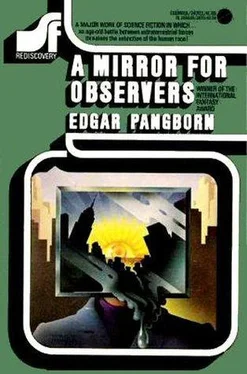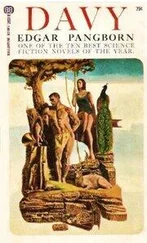“Very lovely.” I wanted to yell at him. He should have been bursting with a need to say: “ So have I! So have I!” “ Mr. Keller told me you painted that.”
“He shouldn’t’ve hung it there. Most people don’t care for it.”
“I suppose…. Still, why not?”
“Too gloomy maybe. I was trying to find out how Rembrandt made a heavy background mean so much. Unfortunately I’m not an artist, Mr. Meisel. I just…” Not an artist, Angelo? “Look, I could swear I’ve heard you speak somewhere, sometime.”
I gave it up, Drozma. A revulsion against all pretense. I know: that’s the medium in which we Observers must live. Yet if I didn’t have that vision of Union within a few centuries I don’t think I could stand this swimming in lies. The superimposing of a human lie on our inevitable Martian lie was too much for me, that’s all. I slumped back in my chair and watched him helplessly. I said: “Yes, Angelo.”
“No…” He started toward me. He gazed foolishly at his cigarette fallen on the carpet, and did not bend to retrieve it until a feather of smoke was curling upward. “No,” he said.
“Nine years.”
“I can’t believe it. I don’t believe it.”
“My face?”
“Well?”
I shut my eyes and talked into reeling darkness: “Angelo, when I was middle-aged, years before I met you in Latimer, my face was badly injured. A gasoline explosion. I’d been a lot of things before then — actor, teacher (as I told your mother), even a sort of hobo for a while. Shortly before that injury I’d struck it rich — invention, happened to catch on. So I had money, took a chance on a surgeon who was working out a new technique. Prosthetic material I don’t begin to understand myself. Unfortunately he had success in only about a third of his attempts, and it raised hell with the failures. Never publicized. He had to give it up. Died a few years ago, knocked himself out trying to develop a test that would eliminate the sixty-odd per cent who couldn’t use it. But I was one of his successes, Angelo. What it amounts to: the stuff is malleable under heat; I can alter the cheekbones if I like, and that changes the whole face.” A smaller lie anyway: one that needn’t cloud our relation — if we were to have any relation. “I did that, when I left Latimer. Took on a new personality, as most people can’t readily do. There was a possibility the police would think I had something to do with your disappearance, and Feuermann’s. Do you remember Jacob Feuermann?”
“Of course,” he whispered, and I could look at him. “What — what became of Uncle Jacob?”
I wobbled on the edge of forbidden truth. “Disappeared, same night you did. All we ever knew. Tried to find you maybe. As I have.”
“Find me…. Why?”
I didn’t even try to answer that. “Do you believe I’m Ben Miles?”
“I — don’t know.”
“Remember the headstone of Mordecai Paxton?”
“Mordecai… Why, yes.”
“Ever tell anyone, who might have passed word to me (whoever I am), that you put dandelions around that headstone?”
“No, I — never did.” And Namir was somewhere close by — sleeping? The doors were closed, our voices very low.
“Did you ever tell anyone about that mirror?”
“Oh! No, never.” He sat on the floor by my chair, his head on his knees. “You must have had better things to do than look for me.”
“No. I still have that mirror, Angelo.”
“Abraham. Abraham Brown, please.”
“All right, it’s a good name.”
“I had — reasons, for taking it in place of my own.”
“Well,” I mumbled, “what’s a self? I’ve lived a long time and don’t know…. Glad to see me?” A stumbling human question.
He looked up and tried to smile along with his muttered “Yes.” A smile of confusion.
“What do you want to do, Abraham? Music?”
“I don’t know.” He stood clumsily and walked to the painting, his back to me; lit another smoke as if cruelly hungry for it. “Bill got me a piano a year ago. I — oh, I work at it.”
“Mm. Billy Kell.”
He didn’t look around. “So you recognized him too.”
“Newspaper photograph. Looked him up on the chance he’d be in touch with you, I’m pretending to be interested in the Organic Unity Party.”
“Only pretending, huh? You never liked Bill, did you?”
“No…. Look at me, Abraham.”
He wouldn’t. “Bill Keller and his uncle have done everything for me. They saved my life, really. A chance to start over, when—”
He stopped.
“I met your fiancée last night, at Max’s.” He just grunted. “Keller and his crowd didn’t buy your brain, Abraham. You know that gang of power-hunters isn’t your dish. You can’t look at me and say it is.”
“Don’t!” He choked on it, but wouldn’t turn around, and somehow there was little force in his protest. “My brain! If you knew — if I had a good one, would I be—” Again he couldn’t go on.
“How long have you been Abraham Brown?”
“Ever since I was picked up in K. C. for breaking a window.”
“What did they do with you?”
“Home for the homeless. Reform school — we weren’t supposed to call it that. The court was my legal guardian. Unfortunately it was a jeweler’s window, though I hadn’t noticed it.”
“Kansas City — that was soon after you left Latimer?”
“Soon? I guess.” He spoke as though suddenly indifferent whether he relived this dream of the past or not. “Latimer — I simply walked away. Junk yard, patch of woods, think I slept there. Didn’t eat anything for two or three days. Later I happened on a rail siding, couple of hobos gave me a hand up. Kansas City. They wanted me to stick with them, but I didn’t belong — not with them or anywhere—”
“Wait a minute—”
“You wait a minute. I’ve never belonged anywhere. I wasn’t even a good hobo, so I walked out on ’em.” He faced me at last, quickly as if to catch me off guard. “I didn’t want anything. Can you understand that? Can you? Twelve years old, hungry, not a cent, but I did — not — want anything! Oh, Christ, there’s not a worse Goddamn thing in the world — well, all right, I saw that plate-glass window — late at night — nice half brick in the gutter, so I thought: ‘ Here! Suppose I do that, maybe it’ll make me interested in something’ — like a nightmare — you try to wake yourself up by hurting yourself….”
“Was it interesting?”
“Made a hell of a fine smash…. I graduated six years later.”
“Never told about the real past?”
“I did not.” He grinned savagely. “History’s a process of selection, remember, Mr. Miles?”
“I met some of your mother’s relatives after her death. Nice people.”
“They were nice people,” said Abraham Brown. “At the school I told three or four different stories. Safer than faking amnesia. They followed up the first two or three, you see, and then decided I was a pathological liar. K. C.’s a long way from Massachusetts. Homeless kids a dime a dozen.”
“Are they, Abraham?”
“That was the impression I received for six years.”
“And it was important not to go back to Latimer?”
“Do you understand your mind?”
“No. But you’re still the boy who was interested in ethics—”
“Oh, Ben!”
“And you’re still blaming yourself for your mother’s death: I want you to stop that.”
He stared blindly, but not without understanding. “Who else—”
“Why blame anyone? Dunn maybe, for hauling you in there without warning and looking like the wrath of God, but he was merely doing his job as he saw it. Why blame anyone? Is blame so important?”
Читать дальше












